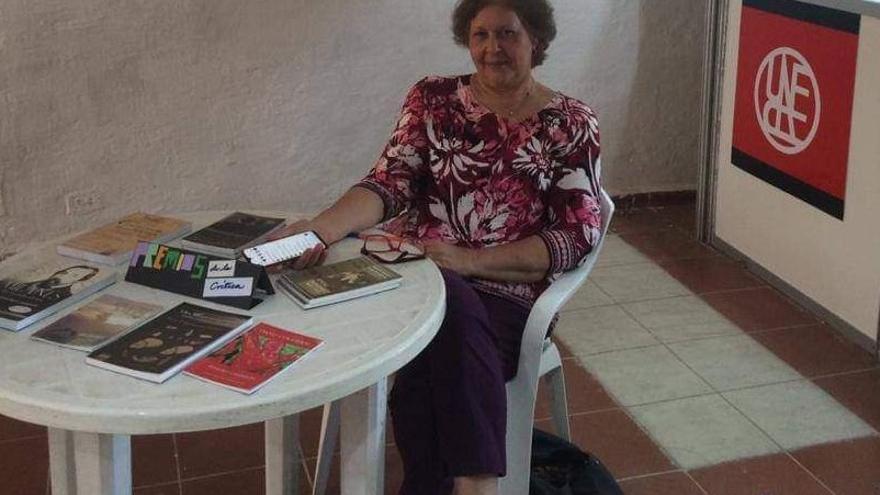
![]() 14ymedio, Madrid, June 2, 2023 — The Cuban historian Alina Bárbara López Hernández, who has been demonstrating peacefully since April on the 18th of each month in the Freedom Park of the city of Matanzas, is regulated; that is, prohibited from leaving the Island.
14ymedio, Madrid, June 2, 2023 — The Cuban historian Alina Bárbara López Hernández, who has been demonstrating peacefully since April on the 18th of each month in the Freedom Park of the city of Matanzas, is regulated; that is, prohibited from leaving the Island.
In a post published this Friday, the professor explained that she knew that she was “regulated for reasons of public interest” when applying for a new passport, since hers had just expired. She was planning to attend an event organized by the Association for the Study of the Cuban Economy in the United States, which she had already attended in 2017.
“I don’t know what that phrase [’regulated’] means, but I will not admit an arbitrariness that contradicts the Constitution of the Republic itself, which in its Article 52 establishes freedom of movement for citizens, and although it clarifies that there may be exceptions, I do not consider myself described in any of them,” López Hernández affirms in her text.
The teacher reports: “I will wait all next week for the authority that decided to regulate me to contact me and inform me that such arbitrariness was reversed.” In addition, she assures that she will not “knock on any door, file any complaint or try to negotiate with anyone.”
After that time, she continues, she will begin to exercise “every week” her “right to peaceful demonstration, this time carrying a sign that will indicate the reasons for my action.” And she concludes: “I am fully aware of the consequences that this may have. I will also be willing to take them on. I’d rather go to prison than be subdued. We will see if those who decide these violations are willing to take the risk of depriving me of liberty.”
On April 6, López Hernández was detained for several hours by State Security after protesting the arrest of the writer Jorge Fernández Era in the same Parque de la Libertad.
In a long Facebook post after being released, she gave the details of her arbitrary detention for exercising “a constitutional right in a country without political rights” and announced that every 18th day she would demonstrate peacefully.
Her petitions would be four: “a National Constituent Assembly democratically elected to draft a new Constitution applicable in all its parts,” “that the State not disengage from the critical situation of the elderly, retirees, pensioners and families who are in extreme poverty,” “freedom for political prisoners without mandatory exile” and “ceasing harassment of people who exercise their freedom of expression.”
On the last occasion, in May, she said that to counteract her action, the authorities organized “a political act” that began “as soon as they saw me arrive”: “Microphones, amplification equipment, flags, very loud music and groups of officials and agents of State Security, always identifiable.”
The teacher began to merit attention from State Security at the same time as the young artists grouped in the event The Worst Generation, censored last October. López Hernández was going to write a preface for a book that would have the same title, which the regime also prevented from being carried out.
She herself denounced the harassment but stayed on social media. After receiving several requests from the political police to be interrogated, she filed with the Provincial Prosecutor’s Office of Matanzas a “formal complaint and action of nullity against official subpoenas.” With this, the teacher managed to get the State Security to annul the summons.
Three months later, inspired by the action, Jorge Fernández Era filed a similar claim of nullity for violation of the Criminal Procedure Law, after receiving a summons from the political police, and did not attend the meeting.
The writer said at that time that the officer who approached him expressly reminded him not to be inspired by the case of Alina Bárbara López Hernández, warning him that “Matanzas is not Havana.”
With the prohibition of renewing her passport, the historian joins the list of Cubans who cannot leave their country because they disagree with the regime or want to exercise their profession independently. Among them are the journalists of this newspaper Reinaldo Escobar and Miriam Celaya, the analyst Julio Aleaga Pesant, the activist Boris González and the director of La Hora de Cuba, Henry Constantín.
Many others, who had also been regulated, managed to leave the Island on the condition of not returning. State Security only lifted their ban on travel abroad after learning of their decision to emigrate. They had been subjected to pressure, police subpoenas and surveillance around their own homes.
Translated by Regina Anavy
____________
COLLABORATE WITH OUR WORK: The 14ymedio team is committed to practicing serious journalism that reflects Cuba’s reality in all its depth. Thank you for joining us on this long journey. We invite you to continue supporting us by becoming a member of 14ymedio now. Together we can continue transforming journalism in Cuba.
